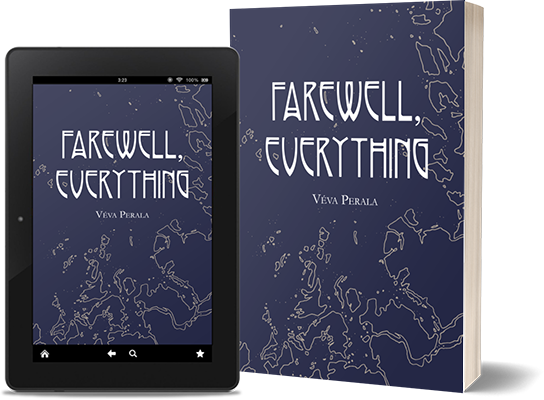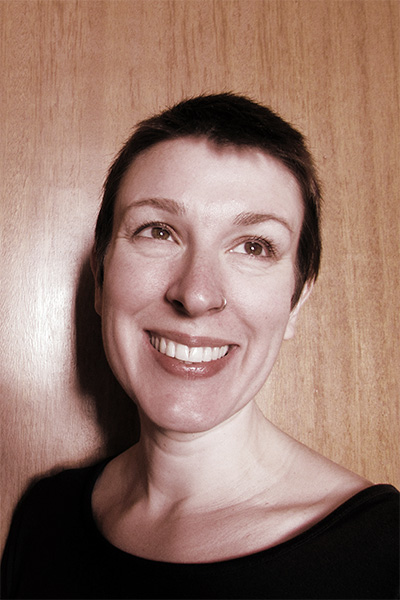Farewell, Everything by Véva Perala
About the Book | About the Author | Media Kit

About the author

H.B. Cavalier was born and raised in the Pacific Northwest, though her experiences in Israel, the West Bank, and the Peruvian Amazon have equally influenced her work. For creative reasons, the character of Véva Perala is credited as author of Farewell, Everything. H.B. Cavalier has identified herself as “translator.” Farewell, Everything is her first novel.
Author interview: 12/13/19
Twenty questions with H.B. Cavalier
On Friday the 13th – just two days after the last full moon of the decade – Nowhere Press sat down with author H.B. Cavalier to ask her twenty questions about her debut novel and what inspired it.
1. Tell us a little about this book.
Farewell, Everything is about a misfit forced face-to-face with the mysteries of the universe. The story follows a sickly runaway’s accidental foray into foreign politics, and the unlikely events that lead him to realize how little he understands life, death, love, and himself. Set in a future that feels more like the past, both personal and cultural histories prove inescapable, even when the details are forgotten. Part social commentary, part spiritual musing, at its core it’s a ghost story – literally and figuratively.
2. What inspired you to write it?
Trauma, to be honest. Psychological fallout. At first, I only used this story as a dumping ground for anxiety and despair. Over time, though, I learned to intentionally process things in my writing, and found it deeply healing – especially after losing a friend with similar struggles to suicide (Farewell, Everything is dedicated to him). Writing this book was my therapy.
3. Who, or what, are your creative inspirations?
The first to come to mind is Miranda July, though her influence is pretty muted in my writing. The pianist James Rhodes also comes to mind – someone who knows the relationship between creativity and healing. Old movies like Casablanca, obviously. Graphic novels, like David B.’s Epileptic. But mostly random concepts – things I’ve found in psychology books, spiritual books, history, cultural evolution. Travel. I don’t know. Inspiration works like dreaming – things just get in your head and melt, maaan. It’s all too trippy to explain.
4. How have the places you’ve been influenced your writing?
That’s fairly straightforward. I borrowed from the beauty of the San Juan Islands, the public transit of Europe, and the bugs of the Amazon and the Middle East. Obviously, cultural details snuck in – I’ve been to Peru four times, so “vine tea” had to at least make a cameo. But the spiders impressed upon me just as much. I woke one night with a tarantula inside my bug net, right by my face. I found a tarantula crawling from my backpack, onto my neck. My travel buddy found a tarantula in his underwear. This stuff stayed with me. But the most disturbing episode happened in Israel. I spent six months volunteering there in my early twenties, and during my stay these giant black and red centipedes started mating. Maybe they were millipedes, I don’t know. I just remember wandering through a field, having to tiptoe around these huge knots, these heaping piles of them. Well one day, completely relaxed with my feet kicked up, wearing a long, flowy skirt – do I even have to say it? Because of my skirt, I couldn’t feel this thing, this red demon bug crawling up until – you get the picture. Long story short, the “bugs” concept in Farewell, Everything was born that very day. I told you I used my story for processing trauma, didn’t I?
5. So, would you rather sleep in a bed full of spiders or a bed full of centipedes?
I would rather die.
6. What is the most difficult part of your artistic process?
Shame. Embarrassment. Humiliation. Shame.
7. Are any of your characters based on real people?
No, though I have encountered people that remind me of my characters. Places, too – sometimes uncannily so. I won’t go into detail, but believe me: magic is real. This world is not as it seems.
8. Can you give us some insight into what makes your main character tick?
He’s different. Having grown up ostracized and isolated, Osha reaches adulthood with a kind of crazed, naïve hunger for experience and connection – a proverbial “fool” vibe that sets the stage for the whole story. His background also made him something of a musical savant – years of undistracted practice, at the expense of social skills. His sexual orientation is up for debate, complicated by the fact that he didn’t expect to survive puberty. He’s scarred by abuse and trauma, but isn’t conscious of the implications of that. He wants love more than he’ll admit, but hasn’t the slightest clue what love even is. Basically, he’s a mess – with a heart of, say, bronze.
9. What’s the most difficult thing about writing a main character of the opposite sex?
Honestly, I’m no better at writing females. Men are much more represented in history, in art, in politics – the male perspective is hardly shrouded in mystery. And for Osha, it’s not really relevant. The main role his sex plays is in freedom of movement. Running away, traveling alone, going home with strangers – these things are far more dangerous for women. What I did feel challenged by, though, was writing sexuality. That’s one area where my experiences fed directly into Osha’s. He’s a bi-romantic asexual craving love in a world that’s convinced him that love equals sex. Lacking the language to define himself and nursing a plethora of excuses for his sexual disinterest, he needlessly complicates and confuses his relationships. Maybe not the best asexual representation, but honest. A cautionary tale for lack of self-awareness – which of course is one of Farewell Everything’s main themes. At any rate, Osha’s defined more by his experiences than his genitalia – as we all are, at the end of the day. And he grows up painfully aware that his body is transient. Above all, he’s a spiritual creature.
10. Do you have a favorite character in your book?
Loren.
11. How long did it take you to write this book?
Between seven and twenty-two years.
12. What did you learn while writing this book?
Oh man, so much about editing. Deep, soul-healing stuff – and editing.
13. What is the key message of your book, if there is one? What do you hope readers take away?
You have to move through darkness to get to light – the whole eclipse motif. Our culture has a tendency to demonize and dismiss anything that hurts, like a curse or a personal failing – but through the lens of myth and metaphor, pain is a catalyst. A helpful and necessary messenger. Growth is rarely comfortable. The wounded healer archetype, shamanic awakenings, even simple growing pains attest to that. So many people view mental or physical or even cultural distress as an empty, unfortunate derailment rather than a meaningful call to change – personally or politically or however. Nothing is all good or all bad. Life is messy, but that doesn’t make it meaningless. Just the opposite, in fact.
14. Why write under a pseudonym?
Most of my life, I’ve written in secret. I grew up with a lot of shame around creativity, so the pen name originally served as a mask. Recently, though, I’ve come to feel I owe the world a little bravery. I’m constantly enjoying gutsy, raw works of art – things like Mount Eerie’s A Crow Looked at Me – and they’ve brought me a strange comfort. It’d be hypocritical for me to hide. But at this point, the pen name is part of the plot, so . . . I guess I’ll be the “translator,” then.
15. What kinds of books do you usually read?
Nonfiction dominates, especially books on very specific things, like crying or touch. With fiction and poetry, I’m picky – which of course ruins me because I’ll never meet my own standards. Gabriel García Márquez, Haruki Murakami, Oscar Wilde. Neruda, Lorca, Rumi. My favorite newer books are Lincoln in the Bardo, by George Saunders, and Belonging: Remembering Ourselves Home, by Toko-pa Turner.
16. What’s your favorite underappreciated novel?
Your Heart is a Muscle the Size of a Fist, by Sunil Yapa – though I wouldn’t say it’s underappreciated by those who’ve read it – I just feel more people should read it. Likewise for The People of Paper, by Salvador Plascencia.
17. What do you think makes a good story?
Unpredictability. Weirdness. Rule-breaking. Emotional sensitivity. Nuance. Trusting the reader to make their own connections and conclusions. I don’t mind morality in books (in fact, I’ve come to appreciate it), but I do mind being told exactly how and what to think.
18. Is it true that anyone can be a writer?
If you hate yourself enough, the sky’s the limit.
19. Do you plan on writing more?
I hope not, but I know better than to trust my word.
20. What do you think happened to your characters after the book ended?
Read the Acknowledgments at the end. *wink*
Return to the main Farewell, Everything book page.
